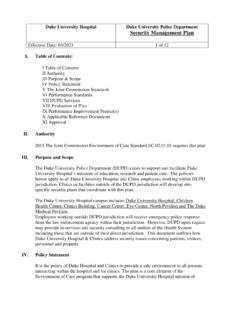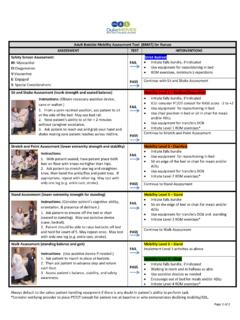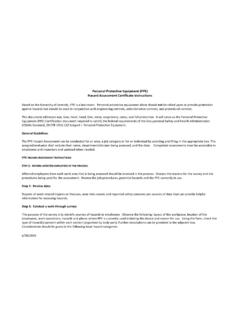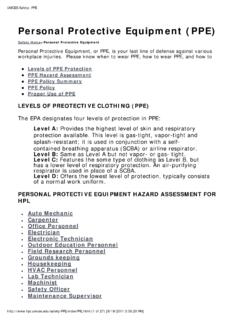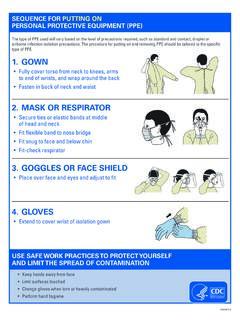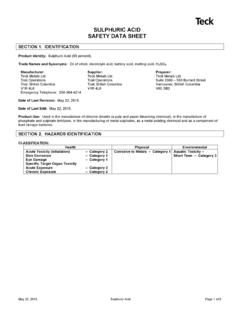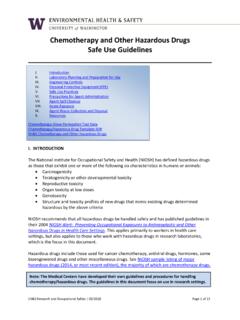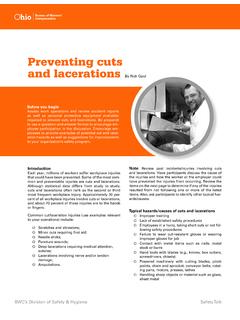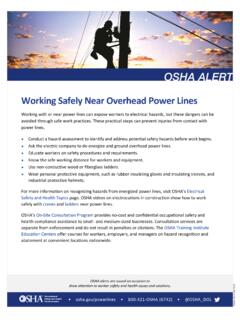Transcription of Electrical Safety Checklist - Duke University
1 Electrical Safety Policy Self Audit Checklist Revised: 04/2008. Where applicable, the correct answer for all questions is YES. NO answers require corrective action. I. Questions for ALL Department work areas: YES NO N/A. 1. Are all extension cords & equipment cords run so as to prevent damage to the cord insulation? 2. Are all extension cords & equipment cords placed in such a manner as to minimize the risk of tripping over the cord? 3. Do extension cords remain in use for less than 30 days? 4. Are all extension cords purchased or in use of the three wire type with a minimum wire size of 14 AWG? (16 AWG is not acceptable.). 5. Do all power strips purchased or in use shall have a cord 6 feet or less in length, a 15 amp circuit breaker/ fuse, and a surge protector? 6. Is plugging extension cords or power strips into one another so as to increase their length or capacity prohibited?
2 7. Is the purchase or use of cube taps prohibited? 8. Is the use of adapters that eliminate the equipment ground (3 prong to 2 prong adapters) prohibited? 9. Do all Electrical panels have a clear area at least 36 inches by 36 inches, centered on the panel, in front? 10. Are the faceplates on switches and receptacles present and do they completely cover the switch/ receptacle wiring? 11. Are receptacles in the employee bathrooms protected by a GFCI? 12. Do all employees know how to contact maintenance for their location? 13. Have all employees taken Basic Electrical Safety for Office Employees? II. Additional Questions for MAINTENANCE/ CONSTRUCTION Departments: YES NO N/A. 1. Do employees inspect their power tools, extension cords, and portable GFCIs (worn insulation, bent/ missing pins, etc.) before use? Page 1. 2. Are all employees involved in maintenance, remodeling, or repair of buildings, structures, or equipment or similar construction like activities provided ground fault circuit interrupter (GFCI) protection while using equipment powered from 125 volt, single phase, 15, 20, or 30 ampere receptacles?
3 3. Do extension cords purchased for maintenance or construction use have ground fault circuit interrupter (GFCI) protection integrated into the design? 4. Do 15 & 20 amp receptacles on rooftops and in outdoor areas have GFCI protection? 5. Have all employees taken Basic Electrical Safety for Maintenance Employees? 6. Have employees who work on high voltage systems or who are at risk of exposure to arc flash been trained on work practices and do they have appropriate Electrical Safety equipment & PPE for their work? III. Additional Questions for HIGH VOLTAGE/ Electrical Shops: 1. Are insulating equipment ( gloves , mats, etc.) inspected for damage before each day's use and after any incident that could be suspected of having caused damage? 2. Are insulating gloves air tested before each day's use and after any incident that could be suspected of having caused damage?
4 3. Are insulating equipment stored in such a location and in such a manner as to protect it from light, temperature extremes, excessive humidity, ozone, and other injurious substances and conditions? 4. Have rubber insulating gloves been electrically tested within the past 6. months? 5. Have rubber insulating sleeves been electrically tested within the past 12 months? 6. Have rubber insulating blankets been electrically tested within the past 12 months? Page 2.



